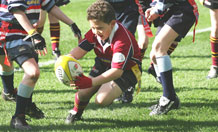
Children playing rugby in one of the pilot areas for the study.
Improving rugby for the next generation of grand slam winners
As the Six Nations comes to an end, a research project is under way to see how changing rugby’s rules at the junior level could help develop the next generation of grand slam winners.
Sports scientists at the University of Exeter are working with the RFU (Rugby Football Union) to see how changing the rules of the game for younger players could improve participation in the sport.
The research project hopes to address a recent decline in those playing rugby by promoting enjoyment and involvement in the game, while also enhancing players’ core skills.
The ‘Shaping the Game’ project is being championed by Gary Townsend, Player Development Manager for the RFU, and new rules are being piloted at under-7 and under-9 age groups in three English counties – Durham, Hampshire and Warwickshire (see ).
Gary said: “We are delighted with our partnership with the University of Exeter. The research will provide us with accurate data to better inform the development of the game, with the needs of the child, and the principles of child development being of primary importance and influence”.
Dr Mark Wilson, from the university’s Sport and Health Sciences department and coordinator of the research, said: “Rugby is a technical game. If you introduce too many rules too early on in a child’s development, it could stifle their progress as a player and reduce enjoyment of the game. As there is much research linking perceptions of competence to continued sport participation, a graded approach to skill introduction is important.
“We’ve been looking at how we can evolve the rules at the junior level to make sure the focus is on enjoyment and involvement, with changes designed to give every player more touches of the ball.
“This means that they’ll get more practice of core skills like passing, tackling, running with the ball, decision-making and tactical awareness. By the time the more technical parts of the game are introduced, it’s hoped this will produce well rounded players. Rugby is a late development game, yet children are sometimes pigeon-holed early and spend most of their time learning position-specific technical skills. ”
Currently there are a number of different rules based on age-groups ranging from under-7s to under-16s, with rules being gradually introduced throughout that time.
The pilot rule changes for each age group take into account where the players are in terms of their cognitive, physical and motor skill development.
For example, in the youngest age category of the game – under 7’s – the new pilot rules would see the game played as 4-a-side rather than 7-a-side.
In current rules, tackling, rucks, mauls, line outs and scrums all get introduced at the under 9 level. The pilot rules will see rucks, mauls, scrums and line-outs left out and the number of players on the pitch reduced.
Dr Wilson added: “By reducing the number of rules and numbers on the pitch it means coaches don’t have to select people for some of the very specific roles until much later on. This means every player gets more time to develop the core skills which are essential, no matter what position you play. Coaches can also spend longer training children to successfully integrate core skills into a game situation rather than having to ‘progress’ on to the next important skill.”
The new rules have been piloted in the three participating counties this season and data from festival games will be analysed over the next few months and compared to games played outside of the pilot areas. The research will not only consider the behaviours of the children on the field, but also the attitudes of the children, their parents and coaches.
It is the job of Gethin Thomas, a PhD student funded jointly by the RFU and the Economic and Social Research Council (via the University of Exeter’s Centre for Sport, Leisure and Tourism) to collect and analyse this information. He said: “The research will assist the RFU in developing a suitable game for children to play at mini rugby level. The results will determine what type of game is needed and should lead to an increase in player enjoyment, game playing ability and a growth in numbers playing the game.”
Date: 11 March 2011
